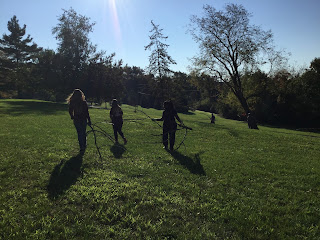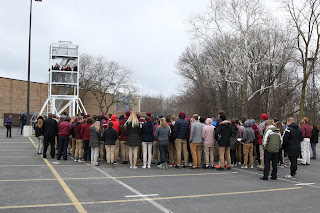Yr 5 D 46: Poverty and Progress
October is an odd month for my classroom. Friday, October 7 was our school-wide Service Day, where our students went all over the city and area, helping at 60-some locations. My little group of 11 went to Camp Lutherhaven in Albion, Indiana, and helped clean up after several dead trees had been taken down.
Then we started a new quarter, where grading starts over and everyone gets a clean slate. This past week was essentially a two-day week: Wednesday we gave the PSAT with an early release followed by parent-teacher conferences, and Thursday and Friday we were off for Fall Break. This Friday I am taking my sociology students to a day of lectures at the university across the street, so I'm missing another day. With so much disconnect, it's hard to plan and get anything done, but today we tried - and I think succeeded, to some degree.
My freshmen are starting Romeo and Juliet, which is one of my least favorite Shakespeare plays to teach so I tend to draw out the introductory classes.
I had them read the textbook intro to Shakespeare "The Genius from Stratford" and take notes, then I invited them to the board to write some of their facts up - my first period class especially is so sleepy they need to move or I lose them completely. I then tell them all the random facts that make history interesting, but we often skip, which is why so many think history is "boring." For example:
 |
| We weren't the most efficient group, but they had fun. |
My freshmen are starting Romeo and Juliet, which is one of my least favorite Shakespeare plays to teach so I tend to draw out the introductory classes.
I had them read the textbook intro to Shakespeare "The Genius from Stratford" and take notes, then I invited them to the board to write some of their facts up - my first period class especially is so sleepy they need to move or I lose them completely. I then tell them all the random facts that make history interesting, but we often skip, which is why so many think history is "boring." For example:
- While the book says Shakespeare's father was a tanner, did you know part of creating leather involved soaking it first in urine?
- His wife Anne Hathaway gave birth six months after the wedding. Bless the freshman who asked, "Was it a premie?"
- Some analyses have shown that up to 30% of women were pregnant when they married in England at this time. (Source)
- With Elizabeth I as a patron, Shakespeare needed to write to please the virgin queen - so his histories weren't unbiased, as my students might have believed.
- Theaters were first built not to make it easier to perform plays, but to instead make money - can't charge people for admission when you host a play in the town square or farmer's field.
- When Shakespeare moved to London, he pretty much left his wife and children behind - and didn't move back until after he retired.
- The audience who came to Shakespeare's plays at the Globe were the same types of people we might find in the infield at a NASCAR race - and the plays often catered to that social class as much as to the royal patrons. My students always consider Shakespeare to be "classy" - but when I point out the blatant sexual innuendo, they eventually change their point of view.





Comments
Post a Comment